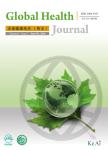Hospitals’responsibility in response to the threat of infectious disease outbreak in the context of the coronavirus disease 2019(COVID-19)pandemic:implications for low-and middle-income countries
作者机构:Department of Global HealthSchool of Public HealthPeking University38 Xueyuan RoadHaidian DistrictBeijing 100191China Institute for Global HealthPeking University38 Xueyuan RoadHaidian DistrictBeijing 100191China Graduate School of EducationPeking University5 Yiheyuan RoadHaidian DistrictBeijing 100871China Peking University Cancer Hospital&Institute52 Fucheng RoadHaidian DistrictBeijing 100142China
出 版 物:《Global Health Journal》 (全球健康杂志(英文))
年 卷 期:2020年第4卷第4期
页 面:113-117,F0002页
学科分类:1002[医学-临床医学] 100214[医学-肿瘤学] 10[医学]
基 金:supported by the National Natural Science Foundation of China(No.72042014).
主 题:Hospital Responsibility Infectious disease Coronavirus disease 2019 COVID-19 Pandemic Implication Lesson Low-and middle-income countries LMICs
摘 要:The WHO declared the coronavirus disease 2019(COVID-19)outbreak as a public health emergency of international concern on January 30,2020,and then a pandemic on March 11,2020.COVID-19 affected over 200 countries and territories worldwide,with 25,541,380 confirmed cases and 852,000 deaths associated with COVID-19 globally,as of September 1,2020.1 While facing such a public health emergency,hospitals were on the front line to deliver health care and psychological services.The early detection,diagnosis,reporting,isolation,and clinical management of patients during a public health emergency required the extensive involvement of hospitals in all aspects.The response capacity of hospitals directly determined the outcomes of the prevention and control of an outbreak.The COVID-19 pandemic has affected almost all nations and territories regardless of their development level or geographic location,although suitable risk mitigation measures differ between developing and developed countries.In low-and middle-income countries(LMICs),the consequences of the pandemic could be more complicated because incidence and mortality might be associated more with a fragile health care system and shortage of related resources.2-3 As evidenced by the situation in Bangladesh,India,Kenya,South Africa,and other LMICs,socioeconomic status(SES)disparity was a major factor in the spread of disease,potentially leading to alarmingly insufficient preparedness and responses in dealing with the COVID-19 pandemic.4 Conversely,the pandemic might also bring more unpredictable socioeconomic and long-term impacts in LMICs,and those with lower SES fare worse in these situations.This review aimed to summarize the responsibilities of and measures taken by hospitals in combatting the COVID-19 outbreak.Our findings are hoped to provide experiences,as well as lessons and potential implications for LMICs.



